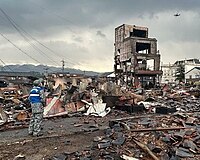
Photo from wikipedia
On 11 March 2011, the Great East Japan Earthquake and subsequent tsunami hit East Japan. We aim to investigate the impact of trauma experiences related to the earthquake on suicide… Click to show full abstract
On 11 March 2011, the Great East Japan Earthquake and subsequent tsunami hit East Japan. We aim to investigate the impact of trauma experiences related to the earthquake on suicide risk among young children, stratified by child sex. Participants at baseline were children who were exposed to the 2011 disaster at preschool age (affected area, n=198; unaffected area, n=82, total n=280). From July 2013 to May 2014, suicide risk was assessed using the Mini International Neuropsychiatric Interview for Children and Adolescents (MINI-KID) in a follow-up interview conducted by a child psychiatrist or psychologist (N=210, follow-up rate: 75%). Among young girls in the affected area, 12 out of 65 (18.5%) showed suicidal ideation, which is significantly higher than girls in the unaffected area (4.7%, p for chi-square=0.036). In the multivariate model adjusted for potential confounders and mediators, the odds ratio for 4 or more trauma experiences related to the earthquake was 5.74 (95% confidence interval: 0.83-39.6, p=0.076) compared to no trauma experience related to the earthquake. Among young boys, trauma exposure was not associated with suicidal ideation. Our findings showed that young girls who experienced earthquake-related trauma at preschool age had a higher suicidal ideation 3 years after the earthquake.
Journal Title: Psychiatry Research
Year Published: 2017
Link to full text (if available)
Share on Social Media: Sign Up to like & get
recommendations!